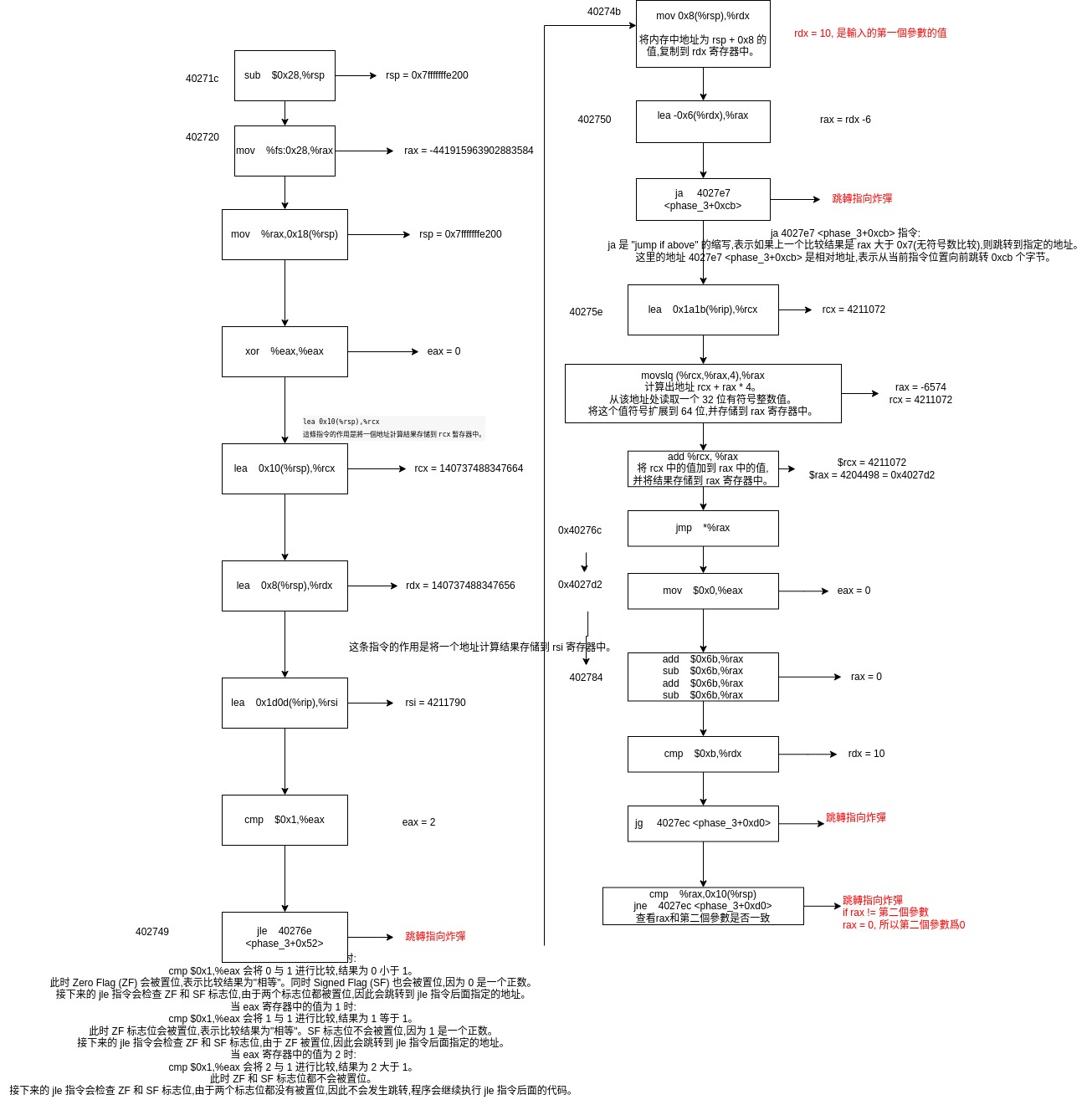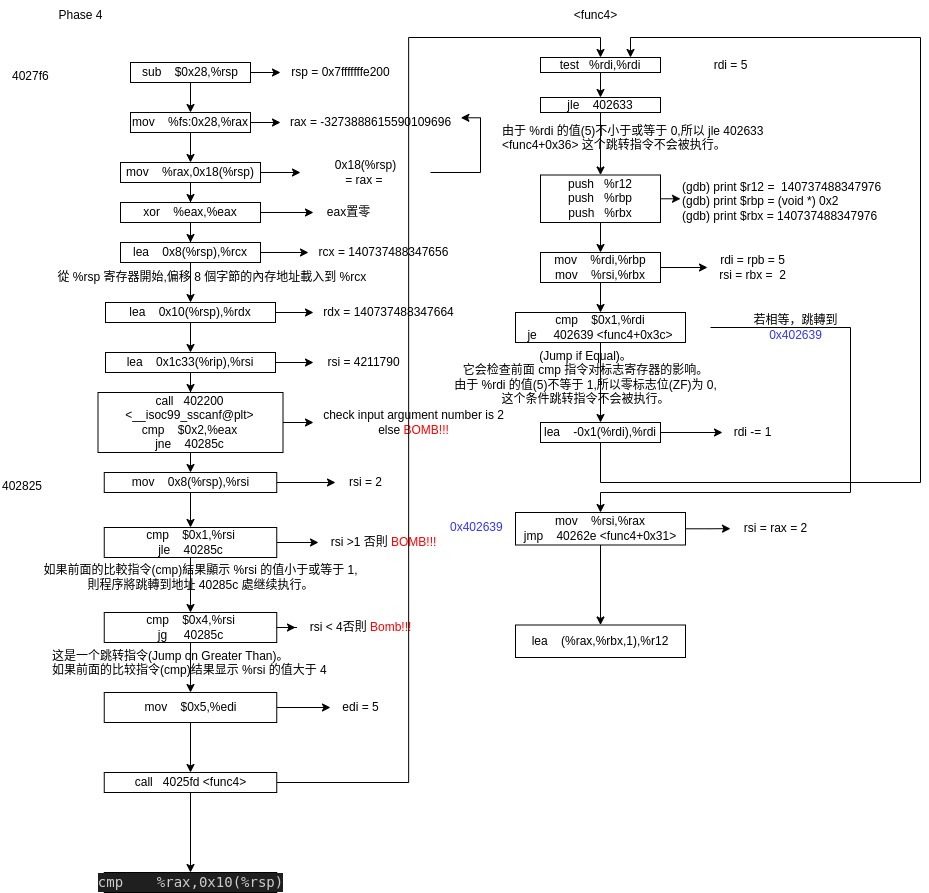Bomb Lab
Phase 1
objdump -d bomb > bomb.as Get the assemble code. Look into phase 1
xxxxxxxxxx000000000040268e <phase_1>:40268e: 48 83 ec 08 sub $0x8,%rsp402692: 48 8d 35 87 4b 00 00 lea 0x4b87(%rip),%rsi # 407220 <sval>402699: e8 26 0b 00 00 call 4031c4 <strings_not_equal>40269e: 84 c0 test %al,%al4026a0: 75 05 jne 4026a7 <phase_1+0x19>4026a2: 48 83 c4 08 add $0x8,%rsp4026a6: c3 ret4026a7: e8 34 0e 00 00 call 4034e0 <explode_bomb>
strings_not_equal is used to trigger the bomb.
xxxxxxxxxx00000000004031c4 <strings_not_equal>:4031c4: 41 54 push %r124031c6: 55 push %rbp4031c7: 53 push %rbx4031c8: 48 89 fb mov %rdi,%rbx4031cb: 48 89 f5 mov %rsi,%rbp4031ce: e8 dc ff ff ff call 4031af <string_length>4031d3: 49 89 c4 mov %rax,%r124031d6: 48 89 ef mov %rbp,%rdi4031d9: e8 d1 ff ff ff call 4031af <string_length>4031de: 49 39 c4 cmp %rax,%r124031e1: 74 12 je 4031f5 <strings_not_equal+0x31>4031e3: b8 01 00 00 00 mov $0x1,%eax4031e8: 5b pop %rbx4031e9: 5d pop %rbp4031ea: 41 5c pop %r124031ec: c3 ret4031ed: 48 83 c3 01 add $0x1,%rbx4031f1: 48 83 c5 01 add $0x1,%rbp4031f5: 0f b6 03 movzbl (%rbx),%eax4031f8: 84 c0 test %al,%al4031fa: 74 ec je 4031e8 <strings_not_equal+0x24>4031fc: 38 45 00 cmp %al,0x0(%rbp)4031ff: 74 ec je 4031ed <strings_not_equal+0x29>403201: b8 01 00 00 00 mov $0x1,%eax403206: eb e0 jmp 4031e8 <strings_not_equal+0x24>
In this function, the register %rdi and %rsi are used to store the string. Therefore, we can use gdb to check what is in them.
xxxxxxxxxx$gdb bomb(gdb) break strings_not_equal(gdb) r(gdb) p/s (char*)$rdi(gdb) p/s (char*)$rsi"Lisa Cortez chilled the old, lavendar pancake."
Phase 2
xxxxxxxxxx00000000004026ac <phase_2>:4026ac: 48 83 ec 48 sub $0x48,%rsp4026b0: 64 48 8b 04 25 28 00 mov %fs:0x28,%rax4026b7: 00 004026b9: 48 89 44 24 38 mov %rax,0x38(%rsp)4026be: 31 c0 xor %eax,%eax4026c0: 48 89 e6 mov %rsp,%rsi4026c3: e8 4c 0e 00 00 call 403514 <read_six_numbers>4026c8: 48 83 3c 24 01 cmpq $0x1,(%rsp)4026cd: 75 0f jne 4026de <phase_2+0x32>4026cf: 48 83 7c 24 08 01 cmpq $0x1,0x8(%rsp)4026d5: 75 07 jne 4026de <phase_2+0x32>4026d7: b8 02 00 00 00 mov $0x2,%eax4026dc: eb 09 jmp 4026e7 <phase_2+0x3b>4026de: e8 fd 0d 00 00 call 4034e0 <explode_bomb>4026e3: 48 83 c0 01 add $0x1,%rax4026e7: 48 83 f8 05 cmp $0x5,%rax4026eb: 77 15 ja 402702 <phase_2+0x56>4026ed: 48 8b 54 c4 f8 mov -0x8(%rsp,%rax,8),%rdx4026f2: 48 03 54 c4 f0 add -0x10(%rsp,%rax,8),%rdx4026f7: 48 39 14 c4 cmp %rdx,(%rsp,%rax,8)4026fb: 74 e6 je 4026e3 <phase_2+0x37>4026fd: e8 de 0d 00 00 call 4034e0 <explode_bomb>402702: 48 8b 44 24 38 mov 0x38(%rsp),%rax402707: 64 48 2b 04 25 28 00 sub %fs:0x28,%rax40270e: 00 00402710: 75 05 jne 402717 <phase_2+0x6b>402712: 48 83 c4 48 add $0x48,%rsp402716: c3 ret402717: e8 04 fa ff ff call 402120 <__stack_chk_fail@plt>
We can check out what is going on after 4026c3 by gdb break
xxxxxxxxxx(gdb) set args psol.txt(gdb) break *0x4026c8(gdb) r(gdb) x $rsp
we can get this output, when we set the second line in psol.txt as 1:
xxxxxxxxxxBreakpoint 1, 0x00000000004026c8 in phase_2 ()(gdb) x $rsp0x7fffffffe1e0: 0x00000001
With more try, we know that the register %rsp is used to store the array. Then we translate the assemble code.
The code
cmpq $0x1,(%rsp)is comparing the value at the memory address pointed to by the rsp (stack pointer) register with the hexadecimal value 0x1 (which is equivalent to the decimal value 1).jne 4026de <phase_2+0x32>:This is a conditional jump instruction, which stands for "jump if not equal".If the comparison in the previous instruction (cmpq $0x1,(%rsp)) resulted in the values being not equal, the program will jump to the instruction at the address 4026de (which is likely the label <phase_2+0x32>, which is the bomb).
Therefore, the first and second number is 1, 1. From the code we know that the loop is doing the Fibonacci array check.
xxxxxxxxxxint i;for (i = 2; i < 6; i++) {if (numbers[i] != numbers[i-2] + numbers[i-1]) {explode_bomb();}}
Write [1, 1, 2, 3, 5, 8] in the second line, we can run the bomb and get
xxxxxxxxxxWelcome to my fiendish little bomb. You have 6 phases withwhich to blow yourself up. Have a nice day!Phase 1 defused. How about the next one?That's number 2. Keep going!
Phase 3
Phase 3 code is longer...
xxxxxxxxxx000000000040271c <phase_3>:40271c: 48 83 ec 28 sub $0x28,%rsp402720: 64 48 8b 04 25 28 00 mov %fs:0x28,%rax402727: 00 00402729: 48 89 44 24 18 mov %rax,0x18(%rsp)40272e: 31 c0 xor %eax,%eax402730: 48 8d 4c 24 10 lea 0x10(%rsp),%rcx402735: 48 8d 54 24 08 lea 0x8(%rsp),%rdx40273a: 48 8d 35 0d 1d 00 00 lea 0x1d0d(%rip),%rsi # 40444e <__PRETTY_FUNCTION__.0+0xce>402741: e8 ba fa ff ff call 402200 <__isoc99_sscanf@plt>402746: 83 f8 01 cmp $0x1,%eax402749: 7e 23 jle 40276e <phase_3+0x52> # !!!!!BOMB!!!!!---------------------------------------------------------------------40276e: e8 6d 0d 00 00 call 4034e0 <explode_bomb>
First look into the value of %eax, with more than 1 input. Set breakpoint after call 402200 <__isoc99_sscanf@plt>
xxxxxxxxxx(gdb) set args psol.txt(gdb) break *0x402746(gdb) run(gdb) info r eax
get the output of:
xxxxxxxxxxBreakpoint 1, 0x0000000000402746 in phase_3 ()(gdb) info r eaxeax 0x2 2
Although we input more than one arguement, the eax is still 2. Therefore we know there are 2 argument in the sscanf. If the eax is 1, the jle 40276e <phase_3+0x52> will jump to 40276e and explode bomb!!!
Next, look at this part:
xxxxxxxxxx40274b: 48 8b 54 24 08 mov 0x8(%rsp),%rdx402750: 48 8d 42 fa lea -0x6(%rdx),%rax402754: 48 83 f8 07 cmp $0x7,%rax402758: 0f 87 89 00 00 00 ja 4027e7 <phase_3+0xcb> # !!!!!BOMB!!!!!
set break point at 402754 we can check that the rdx is the first input a, and rax = rdx-6 <= 7. Legal fist input a<=13
 Input
Input a = 10, b = 0 with (gdb)stepi we can defuse the phase3 bomb.
Phase 4
xxxxxxxxxxmov 0x8(%rsp),%rsicmp $0x1,%rsijle 40285c <phase_4+0x66>cmp $0x4,%rsijg 40285c <phase_4+0x66>
We know that 1<b<4
xxxxxxxxxxcall 4025fd <func4>cmp %rax,0x10(%rsp)
After the <func4> the output rax should equal to the first input a = 0x10(%rsp) =24. Therefore a = 24, 1<b<4
xxxxxxxxxxint func4(int n) {if (n <= 0) {return 0;}int result1, result2;if (n == 1) {return n;}result1 = func4(n - 1);result2 = func4(n - 2);return result1 + result2 + n;}

Phase 5
First, set break points at this two place for safety
xxxxxxxxxx(gdb) break *0x402886(gdb) break *0x4028b6
rsi is the place for us to select the data
(gdb) x/128c $rsi
xxxxxxxxxx0x4041a0 <array.0>: 2 '\002'0x4041a8 <array.0+8>: 10 '\n'0x4041b0 <array.0+16>: 6 '\006'0x4041b8 <array.0+24>: 1 '\001'0x4041c0 <array.0+32>: 12 '\f'0x4041c8 <array.0+40>: 0 '\000'0x4041d0 <array.0+48>: 9 '\t'0x4041d8 <array.0+56>: 3 '\003'0x4041e0 <array.0+64>: 4 '\004'0x4041e8 <array.0+72>: 7 '\a'0x4041f0 <array.0+80>: 14 '\016'0x4041f8 <array.0+88>: 5 '\005'0x404200 <array.0+96>: 11 '\v'0x404208 <array.0+104>: 8 '\b'0x404210 <array.0+112>: 15 '\017'0x404218 <array.0+120>: 13 '\r'
The program is input the index for the memory, and try to map and combine the character to the target value 0x5264cb -> in binary 0101 0010 0110 0100 1100 1011. Therefore, we need to select the char 5, 2, 6, 4, 12, 11 whose index is [11, 1, 2, 8, 4, 12], in char you can use this as 6 byte input: ;0284<. There can be multiple answers according to the ascii table.
Phase 6
We can know from the code that the input is between 1 to 6, and can not repeat.
xxxxxxxxxx(gdb) x/12gx ($rsp)0x7fffffffe1b0: 0x0000000000000001 0x00000000000000020x7fffffffe1c0: 0x0000000000000003 0x00000000000000040x7fffffffe1d0: 0x0000000000000005 0x00000000000000060x7fffffffe1e0: 0x0000000000407250 0x00000000004072700x7fffffffe1f0: 0x0000000000407290 0x00000000004072b00x7fffffffe200: 0x00000000004072d0 0x00000000004071e0
check the value in the memory we get:
xxxxxxxxxxx/x 0x0000000000407250 : 0x72x/x 0x0000000000407270 : 0x29x/x 0x0000000000407290 : 0x34x/x 0x00000000004072b0 : 0x51x/x 0x00000000004072d0 : 0x4cx/x 0x00000000004071e0 : 0x63
1 6 4 5 3 2